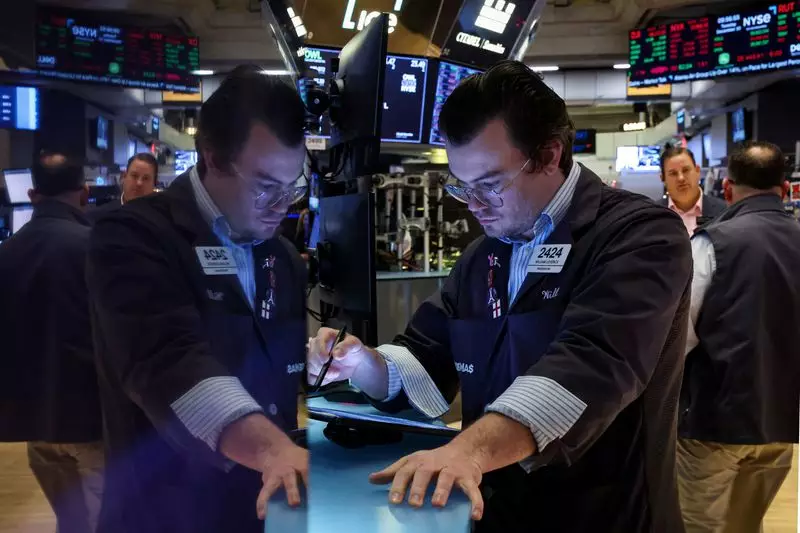The financial markets on Wall Street have experienced turbulent fluctuations over the past year, but certain recent developments have sparked a renewed sense of optimism. Central to this resurgence is the tech sector, particularly companies involved in artificial intelligence (AI). For instance, Broadcom recently announced a rosier-than-expected forecast, attributing a substantial uptick in its stock value to projected demand for its AI chips. As investors absorbed this information, Broadcom’s market capitalization surpassed an impressive $1 trillion, marking a significant milestone for the company.
This meteoric rise in stock prices, particularly for Broadcom which skyrocketed by over 21%, has ignited fervor among market participants, demonstrating the broader appeal of technology firms that capitalize on cutting-edge innovations. According to market analyst Peter Andersen, it’s not unexpected for firms engaged in such a transformative sector to report robust earnings and subsequently raise revenue forecasts. This enthusiasm for tech stocks, especially those linked to AI, has generated waves of investor excitement, contributing to a rally that may be both a blessing and a potential source of risk.
Sector-Wide Impact and Broader Implications
Notably, the ripple effect of Broadcom’s strong results extended beyond its individual stock, bolstering the positions of similar firms in the semiconductor industry. Companies like Marvell Technology enjoyed a price increase of 9.5%, reflecting a broader industry trend. However, despite these gains in technology, the overall market displayed a more complex dynamic, with seven out of eleven sectors on the S&P 500 struggling to maintain their positions. The information technology sector’s more than 1% positive movement is noteworthy but is counterbalanced by the declines seen within other sectors, indicating potential fragility amidst this bullish sentiment.
As we analyze this market behavior, it becomes apparent that the ongoing rally reflects both investor enthusiasm for tech innovations and a response to monetary policy signals from the Federal Reserve. Recent inflation data suggesting stable price pressure has contributed to favorable expectations for a potential 25 basis points rate cut in the upcoming Fed meeting. This situation provides further momentum for the markets, with traders largely betting on easing monetary conditions. Such cuts might theoretically stimulate growth, enhancing investor risk appetite, but there are emerging cautionary tones, as highlighted by Moody’s economic research director Ermengarde Jabir.
Jabir’s insights raise critical questions about the sustainability of this tech-induced optimism. While a rate cut could inject vigor into the economy, recent economic indicators suggest a need for caution—given the delicate balance central banks must maintain between stimulating growth and preventing runaway inflation. As traders configure their strategies around these shifting economic forecasts, potential inconsistencies in monetary policy could lead to heightened volatility in stock markets, counteracting some of the current bullishness.
At present, the performance of major indices paints an optimistic picture: the Dow Jones Industrial Average and the S&P 500 are steadily recovering, even as certain stocks face downward pressure. Nevertheless, while the Nasdaq Composite is set for gains, the broader market’s mixed signals raise red flags about the underlying strength of this rally, particularly in relation to systemic risk if technology stocks continue to dominate.
The broader stock market, while buoyed by technology, reveals a deeper narrative. Salesforce, for instance, received an upgraded outlook from analysts, pushing its stock up by 1.4%, while RH’s notable 14.5% rise in response to better-than-expected earnings illustrates how even within this tech-driven context, individual company dynamics play an essential role in shaping market sentiment.
In contrast, declining shares have outstripped gainers, presenting challenges for sustained upward momentum. The S&P 500 and Nasdaq are grappling with an array of new highs and lows, indicating that despite overall gains, a level of volatility persists beneath the surface.
Wall Street’s current landscape, dominated by tech enthusiasm amid a favorable monetary backdrop, underscores both opportunities and risks. The ongoing AI hype, fueled by substantial revenue forecasts from key players like Broadcom, has provided a short-term booster shot for investor sentiment. However, as economic signals continue to shift, market participants would be wise to maintain vigilance against potential pitfalls of over-exuberance. Ultimately, the quest for sustainable growth must address the complexities of technological advancement and its broader economic implications, ensuring that today’s rally does not bloom into an unwieldy bubble tomorrow.

